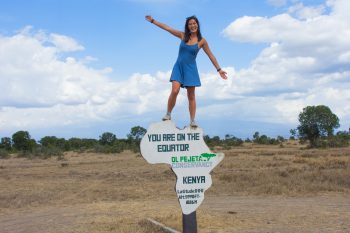By Elodie Kwan
“Keep making the world better than you found it.” A good friend gave me this note before I left for Kenya. I’ve kept it in my wallet ever since. It’s a daily reminder of why I came to Kenya in the first place, why I chose to pursue a career in the social enterprise space, and why I do what I do.
I am currently completing my third and final co-op in Nanyuki, Kenya at an agribusiness social enterprise called Eco Fuels Kenya (EFK). Founded in early 2012, EFK began processing the croton nut, a nut indigenous to East Africa, to produce clean energy and high-value organic agricultural products. What makes EFK a social enterprise is its innovative value chain that addresses both rural poverty and the struggling agricultural sector in central Kenya. Forty-six percent of the Kenya population live in poverty, sustaining on less than $1.25 per day, and 80 percent are engaged in agricultural activities; yet traditional high-value cash crops like coffee and tea are increasingly disenfranchising the smallholder farmers and an over-reliance on chemical fertilizer has degraded soils. Enter EFK.
EFK has made these bottom-of-the-pyramid, disenfranchised smallholder farmers an integral part of their value chain. Because croton trees are grown on most farms, serving as border fences and shade for other cash crops, and require little maintenance, farmers have become EFK’s croton nut collectors. By collecting this once useless nut, these farmers are selling the nuts to EFK and generating additional income that in turn is used to purchase necessary household items, pay their children’s school fees, and/or to be reinvested in their farms. In 2016, we collected 886 tons of croton nuts, double our 2015 collection. This 886 tons translates into translates into $88,600 in additional income for our harvester network. For our farmers living on less than $1.25 per day, this additional income gets them a long way. Once collected, the croton nuts are processed at EFK’s factories into clean energy and high-value organic agricultural products which are then sold back to smallholder farmers, SMEs, and larger agribusinesses all across Kenya.
 My role at EFK varies project-to-project, and that’s exactly what I wanted coming here. Ranging from financial analysis and fundraising material creation to grant writing, field work, and inventory management, I get to dive headfirst into every aspect of this business. I get the opportunity to understand firsthand the growing pains of a social enterprise startup, as well as more importantly, be a part of the solution. The EFK team is passionate and supportive but most importantly, open to new ideas. At each of my co-ops, my role varied amongst the established company hierarchy. Here at EFK, I really feel as though I am an essential, contributive member of the team. I’m given the freedom to run in the direction I want with my projects. My tone of voice is heard in the grant applications. My financial work gets sent to investors. It’s really quite a change of pace from my previous co-ops.
My role at EFK varies project-to-project, and that’s exactly what I wanted coming here. Ranging from financial analysis and fundraising material creation to grant writing, field work, and inventory management, I get to dive headfirst into every aspect of this business. I get the opportunity to understand firsthand the growing pains of a social enterprise startup, as well as more importantly, be a part of the solution. The EFK team is passionate and supportive but most importantly, open to new ideas. At each of my co-ops, my role varied amongst the established company hierarchy. Here at EFK, I really feel as though I am an essential, contributive member of the team. I’m given the freedom to run in the direction I want with my projects. My tone of voice is heard in the grant applications. My financial work gets sent to investors. It’s really quite a change of pace from my previous co-ops.
 And to top it all off, Kenya is a beautiful country with endless outdoor activities. Whether you’re looking to camp, hike, swim, see animals, or just explore, there’s always something to do. I’ve been on game drives and safaris, hiked around the area, and swam in beautiful natural pools but still feel like I’ve barely touched any of it. I’ll be climbing Mount Kenya in June with a friend from Northeastern and then Mount Kilimanjaro in September! I’ve caught the travel bug and found a passion for solving problems in the world. Kenya couldn’t be a more perfect place for me. Officially, my co-op ends August, but the way things are looking, I definitely think I’ll be sticking around for a bit longer!
And to top it all off, Kenya is a beautiful country with endless outdoor activities. Whether you’re looking to camp, hike, swim, see animals, or just explore, there’s always something to do. I’ve been on game drives and safaris, hiked around the area, and swam in beautiful natural pools but still feel like I’ve barely touched any of it. I’ll be climbing Mount Kenya in June with a friend from Northeastern and then Mount Kilimanjaro in September! I’ve caught the travel bug and found a passion for solving problems in the world. Kenya couldn’t be a more perfect place for me. Officially, my co-op ends August, but the way things are looking, I definitely think I’ll be sticking around for a bit longer!


